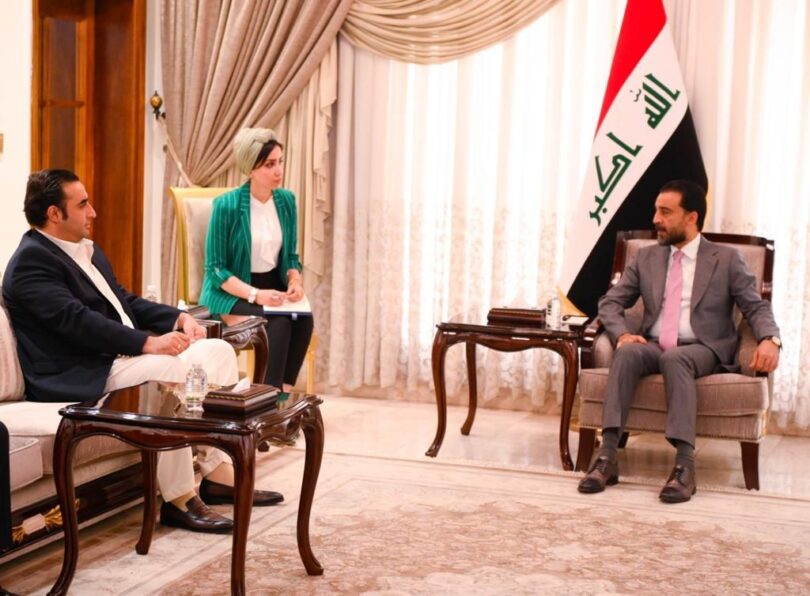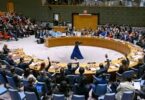Foreign Minister Bilawal Bhutto Zardari called on the Speaker of the Iraqi Parliament, Muhammad Riqan Al-Halbusi on Tuesday during his three-day visit to the Arab nation. Mr. Bhutto held wide-ranging discussions with the top Iraqi lawmaker and expressed his belief that cooperation between the two countries will contribute to the strengthening of fraternal relations between Pakistan and Iraq. He emphasized the importance of fostering high-level parliamentary relations between Pakistan and Iraq, highlighting the potential for both countries to benefit from sharing their respective experiences and expertise. The leaders exchanged views and perspectives on strengthening the ties between the two countries in the political realm.
Pakistan and Iraq are two brotherly Muslim countries that are linked through multiple bonds of religion, history, language, and culture as well as common heritage and Muslim brotherhood. The bilateral relations between the two countries remained at low par under former President Saddam Hussain, however, Pak-Iraqi ties grew rapidly after the democratically elected governments took control over the country in the post-US era. The Republic of Iraq has gone through one of the most challenging times in its history, as the brave Iraqi nation not only got freedom from foreign occupation, but also resolutely defeated ISIS, and eradicated the menace of violent terrorism and extremism from its soil in recent years. Now, a moderate Iraq has emerged on the map of the world that is not only pursuing its economic and political agenda but vigorously working for the integration of the Arab community along with cementing its links with Muslim countries around the globe.
Iraq, a resource-rich Arab nation has a unique importance in the region as well as in the world. Pakistan attaches high importance to its relationship with the Republic of Iraq and continuously endeavors to forge a mutually beneficial long-term strategic partnership that promotes fraternal ties and serves the economic, political, and trade interests of both nations. Pakistan looks to Iraq as a future energy hub to fulfill its oil and gas needs as well as perceives the rich Arab nation as a potential market for its industrial and agricultural goods. At the same time, Iraqi leadership intends to promote its defense and secuirty relations with nuclear-armed Pakistan along with the promotion of trade, economic and cultural ties with the South Asian nation.
During the recent visit of Foreign Minister Bilawal Bhutto Zardari, both countries held in-depth discussions to promote their bilateral relations while particular focus had been given to facilitating travel and tourism, increase government to government exchanges, promote people-to-people contact, facilitate businessmen and entrepreneurs to visit each other country, create bonds and expand cooperation in diverse areas including enhancing bilateral trade and investment, collaborating with the Iraqi government in rebuilding and re-construction of its infrastructure and sharing of expertise in water management and agriculture. Both countries had signed two Memorandums of Understanding (MoUs) aimed at further enhancing cultural cooperation and extending visa waiver facilities for diplomatic and official passport holders. The Foreign Minister also laid the foundation of the new Embassy building in Bugdad along with opening a Consulate General of Pakistan in Najaf to facilitate religious devotees/ Zaireens of both countries.
Realistically, Pakistan-Iraq bilateral trade is of a trivial nature and it does not commensurate with the historic political and religious bonds between the two countries. As for travel and tourism are concerned, only Pakistani religious devotees/ Zahireen visit Iraqi religious sites, while Pakistani expatriate labor/ workforce has a nominal presence in Iraq, thus opening a Consulate in addition to an already working Embassy in the Iraqi capital is an ostensibly irrational decision amid rapidly worsening economic situations of the country. Apparently, Pakistani policymakers had always been influenced more by their religious sentiments and sectarian belief instead of national paradigms and regional geopolitical conditions. Owing to these reasons, the Pakistani government begs trade from the Gulf nations and China with whom it has strategic alignment while it contradicts Europe and America which are major buyers of its industrial products and natural commodities. Although Mr. Bhutto has fully enjoyed the state hospitality of the Iraqi government and energized his religious devotion, the true impact of his prolonged tour on Pak-Iraq ties would be evident in the future.







